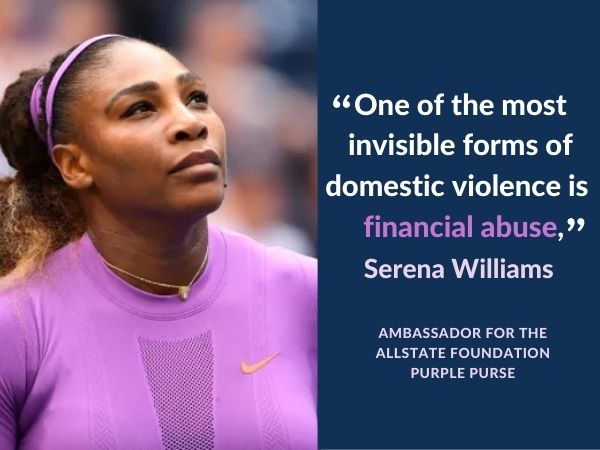The notorious big question: why are Canadians not talking about economic abuse? Join the discussion to #HelpUsRise

Sara finally leaves her abusive marriage. Her credit is ruined by the debt her husband fraudulently accrued in her name. She has no resources. She has nowhere to turn.
On unceded territory in Canada, November is a time when men have mustaches, people wear poppies to honour and remember our fallen heroes, trees show off their vibrancy and people over think pumpkin spice.
This November in Canada, in the world, things look different. Amongst the back drop of fall, a pandemic looms. On November 7th, a spark of hope bursts through the gloomy atmosphere, as Kamala Harris becomes the first female vice president-elect of the United States of America!
November is also national domestic violence awareness month, financial literacy month, and woman abuse prevention month. That is why the Canadian Center for Women’s Empowerment (CCFWE) has launched its first national awareness campaign running the month of November.
The CCFWE is a non-profit organization dedicated to empowering domestic violence (DV) survivors (like Sara) through advocacy, mentorship, and economic empowerment. The CCFWE is working to fill the troubling gap in resources dedicated to helping women recover from economic abuse.
What is economic abuse?
According to the United Nations, financial or economic abuse (often used interchangeably) involves making or attempting to make a person financially dependent by maintaining control over financial resources, withholding access to money, and/or prohibiting attendance at school or employment.
Economic abuse is wider in its definition than ‘financial abuse’, a term usually used to describe restricting access to money, or exploitation of another person’s money (think fraud and theft, for example). In addition to that, economic abuse can also include limiting access to essential resources such as food, clothing or transport, and denying the means to advance a person’s economic status (Sharp 2008).
Sadly, economic abuse is experienced by more than 94% of women who experience intimate partner violence.
Why is a national campaign important?
Campaign. Ugh.
You may think…enough with campaigns already. We are already bombarded by so many campaigns. However, it is time to come together on this rarely discussed but crucial issue. This is the time to educate financial institutions and policymakers about the different economic challenges faced by survivors of domestic violence.
Remember Sara? Unfortunately, she is not an anomaly. Studies have shown that 1 in 4 women are subjected to financial abuse even after they have left an abuser.
Awareness is the first step in combating any problem. Being aware of what economic abuse encompasses, can help put a stop to it. The national campaign will provide people with information to identify and respond to it.
CCFWE’s national #HelpUsRise campaign aims to educate the public on what economic abuse is, how to recognize it within the context of domestic abuse, and how to seek help.
Why is this urgent?
Economic abuse is rarely talked about yet it remains a widespread issue faced by survivors of domestic violence in Canada; a difficult situation made worse by the global COVID-19 pandemic.
The conditions created by the pandemic were ones that were widely recognized by advocates as likely to augment the risk of violence while at the same time making it more difficult for those experiencing violence to seek help.
According to the World Health Organization, gender-based violence (GBV) and violence against women has been referred to as a pandemic worldwide, and more recently, as the “shadow pandemic” of the COVID-19 pandemic.
Understanding the Impacts of COVID-19 on Gender-Based Violence Service Provision is a national survey that was developed collaboratively by the Ending Violence Association of Canada and Anova. The purpose of the survey was to learn about the impact of the COVID-19 pandemic from service providers and advocates who are working with survivors of gender-based violence (GBV) and/or delivering GBV-focused services across Canada. From May 18 to July 20, 2020, 376 staff and volunteers in the GBV sector responded to this survey.
The concerning findings confirmed that amongst the many changes GBV staff and volunteers identified in survivors’ experiences of violence: 46% noticed changes in the prevalence and severity of violence, with 82% of these workers describing an increase in prevalence and severity of violence .
What can you do?
It is a common strategy for an abusive partner to hide assets and inf
Your support is desperately needed to #HelpUsRise:
- Sign our Pledge to Fight Economic Abuse and become an advocate in your community for Economic Justice;
- Support our Petition to immediately expand the Federal Strategy to end Gender-Based Violence to include financial and economic abuse;
- Participate in CCFWE Economic Abuse and Financial Literacy Webinars;
- Mark Economic Abuse Awareness Day on November 26 by participating in CCFWE’s online Speakers Panel discussing how we can all work together to protect women from Economic Abuse;
- Share #HelpUsRise on your social media in November. Check out our Social Media Toolkit with downloadable captions, images and filters to help fuel your social media discussions about Economic Abuse.
We are all in this pandemic together, help us rise. Thank you in advance for being an advocate for Economic Justice!
By Lisa Smith, Volunteer CCFWE

